MASKS OFF Queer theatre in Canada
By Matthew Bradford
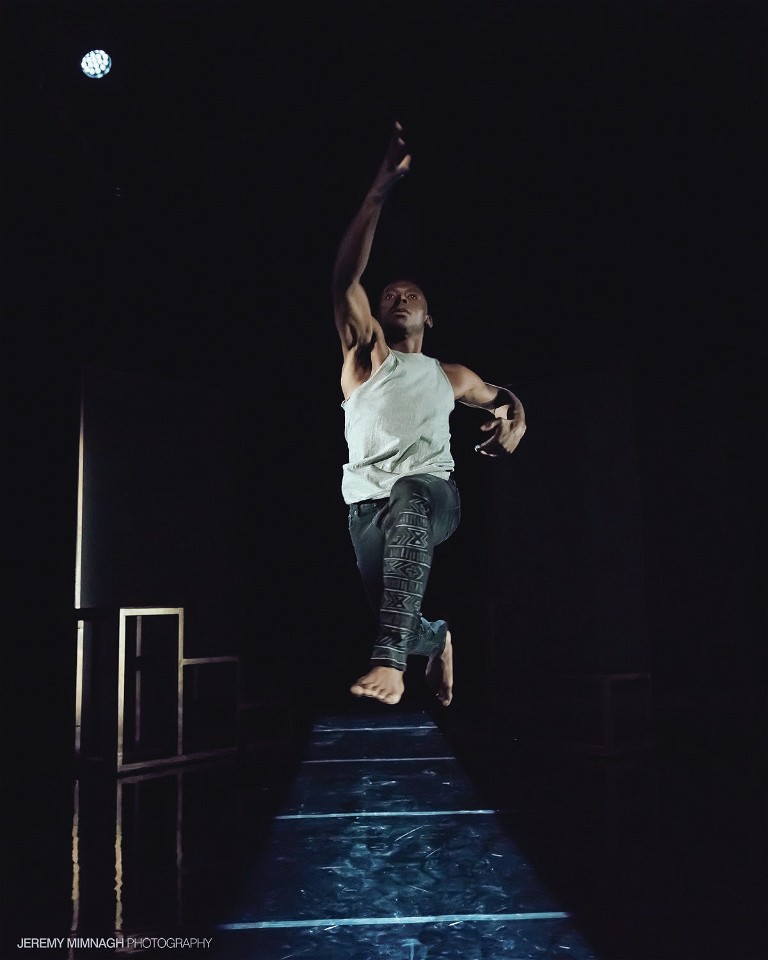
Thomas Olajide performing in Black Boys at the Buddies in Bad Times Theatre.
Photo by Jeremy Mimnagh.
Oftheatre and pride, Terrence McNally once said, “Write plays that matter. Raise the stakes. Shout, yell, holler, but make yourself heard.” Years later, the iconic playwright’s philosophy for impactful storytelling is shared by creators and performers throughout Canada’s 2SLGBTQIA+ theatre community.
Play by play and act by act, creatives throughout Canada’s queer theatre community are finding their audience. And today, venues like Toronto’s Buddies in Bad Times Theatre play an essential role in giving them a stage.
Buddies in Bad Times is regarded as the largest and longest-running queer theatre company in the world. Founded in 1979 by Sky Gilbert, Matt Walsh and Jerry Ciccoritti, Buddies in Bad Times has premiered over 1,000 new works and counting, ranging from early commercial successes such as Sky Gilbert’s Lana Turner Has Collapsed! (1980), The Dressing Gown (1984) and Drag Queens on Trial (1985) to later hits like Waawaate Fobister’s Agokwe (2008), Tawiah M’Carthy’s Obaaberima, (2012) saga collectif’s Black Boys (2016), Daniel MacIvor’s 2-2 Tango and Evalyn Parry (a former artistic director) and Laakkuluk Williamson Bathory’s Kiinalik: These Sharp Tools (2017), among many others.
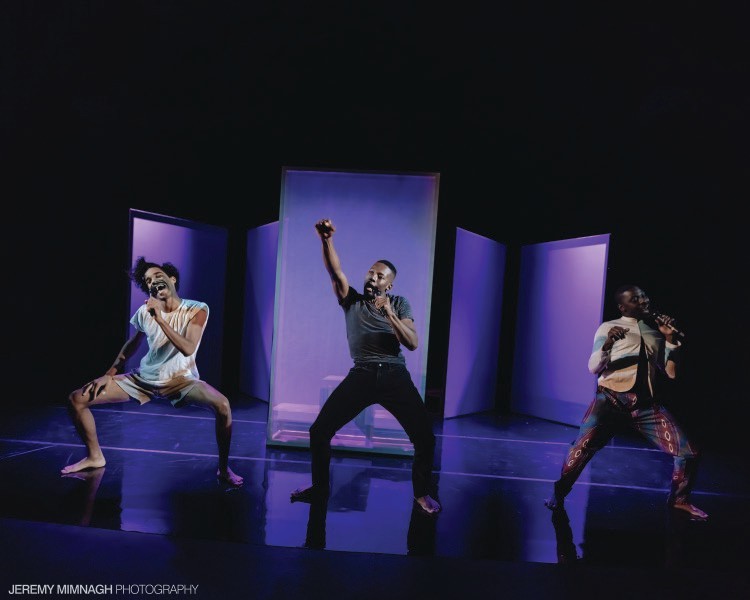
Stephen Jackman-Torkoff, Thomas Olajide and Tawiah M’Carthy performing Black Boys at the Buddies in Bad Times Theatre.
Photo by Jeremy Mimnagh.
“One of the things we’ve focused on over the years is embracing the word queer and how expansive that term can be in terms of performance, content, form and community building,” says Daniel Carter, the theatre’s managing director. And while the venue has earned worldwide acclaim for breaking barriers and launching careers, Carter believes it’s the company’s local impact that strengthens its legacy.
“What’s so lovely about Buddies in Bad Times is that, on any given day, we welcome a diverse and intergenerational audience, who joins us for workshops, theatre productions or our latenight performances. Buddies is this sort of confluence of a multitude of communities,” he continues. “For almost 45 years, Buddies has been this place where folks in Toronto can find and build community through performance in a meaningful way. I feel like that’s something we’ve always focused on carrying forward and making space for as a company.”
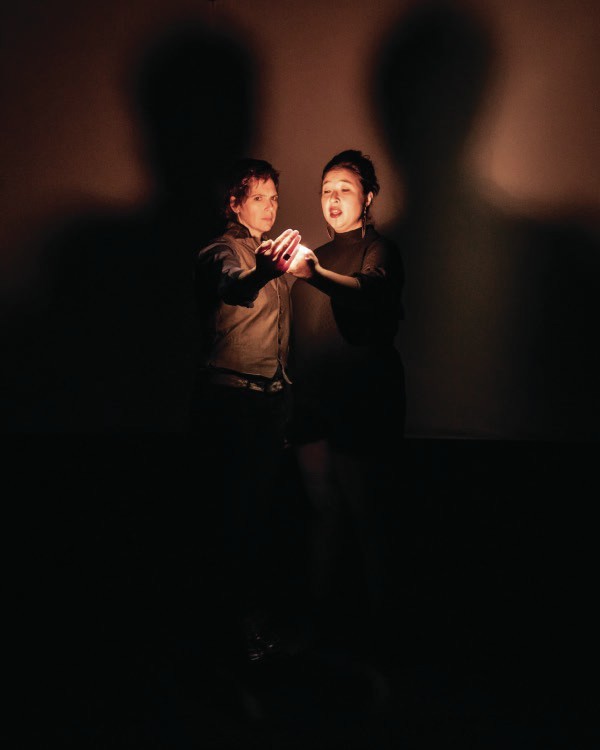
Performance of Kiinalik: These Sharp Tools at the Buddies in Bad Times Theatre.
Photo courtesy of the theatre.
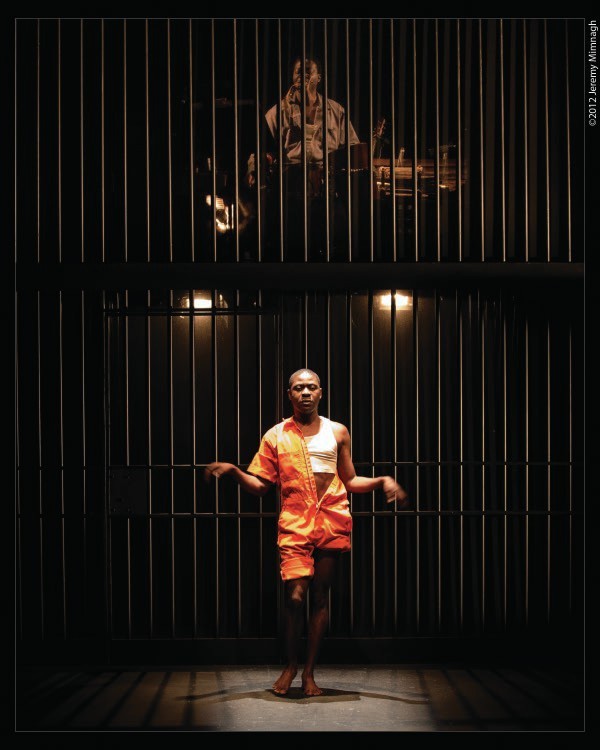
Kobèna Aquaa-Harrison and Tawiah Ben M’Carthy performing Obaaberima at the Buddies in Bad Times Theatre.
Photo by Jeremy Mimnagh.
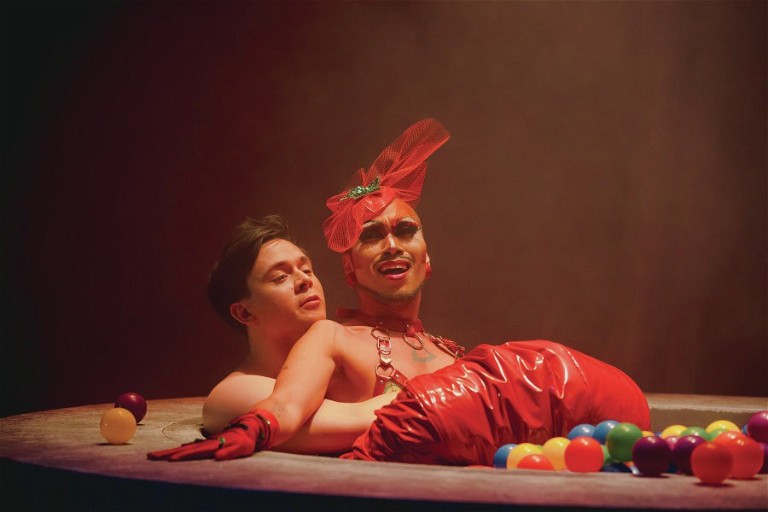
Performance of Rick Tae’s My Little Tomato at Zee Zee Theatre.
Photo by Sarah Race.
Pictured: Taylor Kare, Shay Dior.
Creating space for 2SLGBTQIA+ stagecraft is also the mission behind Vancouver’s Zee Zee Theatre. It was founded in 2008 by Cameron Mackenzie, a seasoned director, producer and (former) “Queen of East Van,” who joined award-winning playwright, actor and husband Dave Deveau in building a company “devoted to telling diverse stories and amplifying the voices of those on the margins with a focus on 2SLGBTQIA+ communities.”
“When I started Zee Zee, there wasn’t really a mainstream queer theatre company in Vancouver, aside from the Screaming Weenies [now the frank theatre], which was mostly doing these cool rock installation pieces in clubs and gay bars at that point,” says Mackenzie. “At the same time, there was also a lot of bad, gay, hit-you-over-the-head-withissues-type theatre coming out of the 90s, so we wanted to do something different.”
Hence, he recalls, Zee Zee Theatre was founded with a broader mission: “I’m gay – surprise! – so there was always going to be some kind of focus on gay storytelling, but I didn’t want that to be the mandate.
I didn’t want to limit us. That’s why we started with a mission to explore the stories of the marginalized, and that’s remained the same today as we evolve with the times.”
At 15 years young, the Zee Zee Theatre has staged a broad range of shows from 2SLGBTQIA+ talent near and far. And while Mackenzie is reluctant to play favourites, there is a special place in the company’s heart for My Funny Valentine.
“[My Funny Valentine] is this heartbreaking show that my beautiful dear husband wrote about the murder of Lawrence King in 2009,” Mackenzie recalls. “It’s the real-life story of a kid from California who liked wearing ‘girl’ clothing to school. One day, he asked a classmate to be his valentine and that classmate brought a gun to school the next day and shot Lawrence dead.”
“It’s a beautiful show that tells Lawrence’s story without wagging a finger or hitting anybody over the head, and it sort of cemented Zee Zee as a force in Vancouver,” he adds.
CREATING OPPORTUNITY
New voices need a stage. And in response, theatre companies like Buddies in Bad Times, Zee Zee Theatre and the frank theatre have led the way in giving new and emerging 2SLGBTQIA+ artists their time in the spotlight.
“New work development has been a long-standing pillar of programming at Buddies,” says Carter. “We have the longest-running residency program solely devoted to new queer work, as well as a robust training and development program called the Emerging Creators Unit, which acts as a launch pad for emerging queer artists, and an intergenerational program that brings together queer youth and seniors to learn from each other and create work together.”
The Zee Zee Theatre has made talent development a priority. Mackenzie recently made headlines for launching the National Queer & Trans Playwriting Unit in 2022, a first-of-its-kind program that provides funding and creative support to a select cohort of 2SLGBTQIA+ playwrights over 10 months. In addition to receiving $2,000 a month, each playwright is guaranteed to see their work produced among the unit’s 10 partnering theatres throughout Canada.
“We had over 200 applicants, which was amazing, but we could only take on five for this first time,” Mackenzie reports. “To actually have them working together weekly and writing plays that will get on the stage feels remarkable. We might not see the impact of this program until five or 10 years later when their careers take off, which is our goal, but to see them taking this step is really exciting.”
IMPORTANCE OF QUEER THEATRE
It hasn’t been long since queer theatre was hidden far from mainstream stages. Today, thanks to a growing number of theatres making space for 2SLGBTQIA+ characters and stories, a more empowered and emboldened generation of creators is making themselves heard.
And that, says Mackenzie, is what makes the stage so important: “Stories are life. Representation matters. It does actual harm to individuals when they don’t see their lives, histories, joys or even hardships reflected in stories. That’s why we’re trying so hard – and succeeding, I believe – to ensure the characters and stories that were once so often marginalized are now seen and shared among audiences that need and deserve to see them.” ■